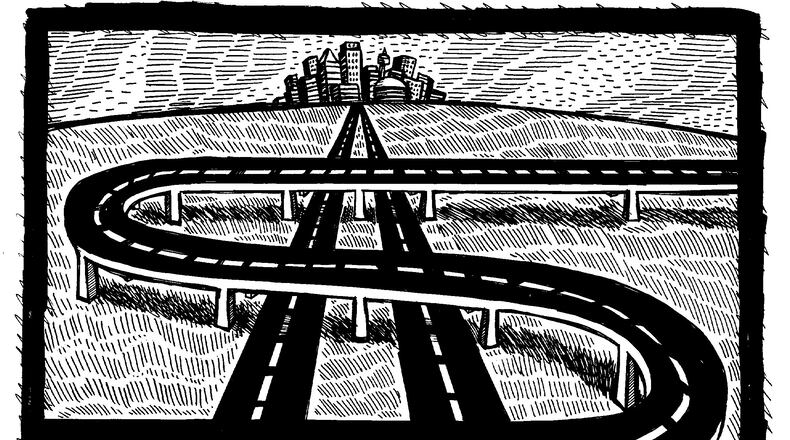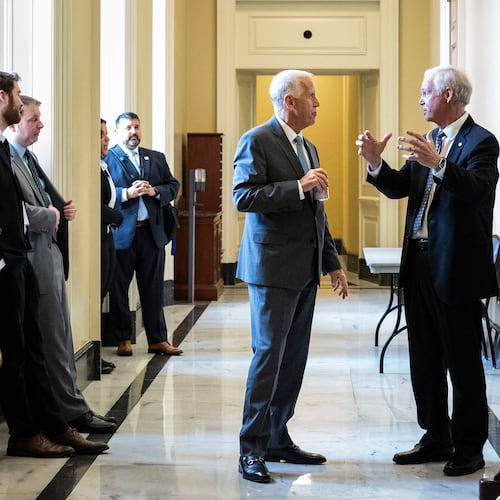Tax reform on international business may be the answer to securing long-term federal money for our nation’s highways, says Congressman Tom Price, R-Roswell, chairman of the House Budget committee.
Price spoke Friday to the Perimeter Business Alliance about federal transportation funding, which Washington has addressed in recent years with a series of temporary short-term patches, a practice that bedevils state transportation departments trying to pay for projects that require big financial commitments.
Congress is determined to pass a six-year transportation bill, Price said, but the House and Senate will have to come together over their differences. He gently mocked the Senate version of a six-year bill for lack of funds to back it up. He also complimented Georgia officials for the new state transportation funding bill which raised local taxes and fees to address our traffic congestion.
Following are excerpts from Price’s lunchtime speech at the Westin Atlanta Perimeter North, and an earlier question-and-answer session for press, edited for space and clarity:
“We’re looking at a highway bill. The Senate has passed a bill that runs six years. It’s classic Senate work, though – it’s a six-year bill that’s funded for three (years). We think having anything short of six years is not a wise idea, but that means having an honest six-year transportation bill. We think we ought to be able to find a funding stream that funds it for the entire six years. It has always frustrated me with this issue because we in Washington don’t seem to appreciate that it takes years to bring about these projects. Nobody contracts for anything on a six-month basis, or an annual basis, or even a two-year basis in the area of transportation. You contract for long periods of time and you have to know what the certainty is of that funding stream coming. Otherwise you don’t do it.
“From a federal standpoint, our goal is to make certain that we bring the kind of resources to bear that are able actually to solve the problem (and) expand the capacity, because that is key to making certain that Atlanta continues to thrive and the metro area continues to thrive.
“Let me share with you what I think is most likely. Tax reform is a huge issue. One of the areas where I think we think we have an opportunity for a new revenue stream for highway funding is in the international tax system. We now punish American businesses that do business overseas, that make money overseas, but when they bring it back here we punish them (with taxes). And so they leave it over there. There’s somewhere between two and three trillion dollars at least sitting overseas. What that means is research and development is harmed here; expanding jobs and growing businesses is harmed here; allowing some benefit to those folks who’ve invested in those businesses is harmed here.
“We think that if you bring about a moderate international tax system (where) you actually capture some of those resources in a way that doesn’t punish those businesses, that’s a new funding stream that would cover the six-year plan, if we were able to do it. That’s a plan that we hope to be able to bring forward.
“Resources are finite. The expansion of mandatory spending is crowding out discretionary spending (for things such as transportation and infrastructure). We at the federal level spend increasing amounts of money on three programs – Medicare, Medicaid, Social Security — and interest on the debt . Forty years ago, discretionary funding was two-thirds of the federal budget; now it’s a third of the federal budget, and it gets smaller and smaller every year. The reason for that is we have refused as a society to address the challenges of Medicare, Medicaid and Social Security.
What you can do is demand (that) your policymakers solve those problems, and then the discussion about the allocation of resources on the discretionary side gets a whole lot easier to talk about, with more resources available for things like infrastructure.
“The current (federal highway funding) stop gap is through the end of October. I’m hopeful that we’ll be able to get this done by the end of the year, but we have a lot to do this fall and a lot of things can confound the calendar.
“We’ve got to be much more creative about how we’re addressing infrastructure and transportation and transit needs in the metro area and our state. Washington is not the piggy bank that it used to be. And it’s not going to be that way again. It’s going to require more accountability. I’m so proud of what Georgia has done to bring more resources to bear so that we can begin to solve these problems. You all have pooled together your resources and your expertise and enthusiasm to make this area better from a transportation standpoint, but we’ve got a long way to go.”
About the Author
Keep Reading
The Latest
Featured



